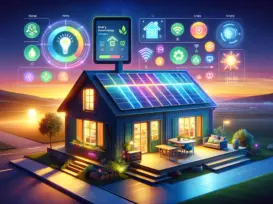Grus Home Energy - IoT home devices
The Future of Smart Homes: Exploring the Benefits of IoT Home Devices
As technology continues to advance, the concept of smart homes has become increasingly popular. IoT home devices, or Internet of Things devices, are playing a major role in revolutionizing the way we live our everyday lives. These devices are designed to connect and communicate with each other through the internet, allowing for seamless automation and control of various aspects of the home.
One of the key benefits of IoT home devices is the convenience they offer. With the ability to control these devices remotely through a smartphone or other connected device, homeowners can easily adjust settings such as lighting, temperature, and security systems from anywhere in the world. This level of control not only adds convenience to our lives but also enhances the overall security and efficiency of our homes.
IoT home devices also have the potential to improve energy efficiency. By monitoring and adjusting energy usage in real-time, these devices can help homeowners reduce their energy consumption and lower their utility bills. For example, smart thermostats can learn a homeowner’s schedule and preferences to automatically adjust the temperature for optimal energy savings. Additionally, smart lighting systems can be programmed to turn off when not in use, further reducing energy waste.
Another advantage of IoT home devices is their ability to enhance home security. From smart cameras and doorbells to motion sensors and smart locks, these devices provide homeowners with added peace of mind by allowing them to monitor and control their home security remotely. In the event of a break-in or other security threat, homeowners can receive instant alerts and take appropriate action to protect their property.
In addition to convenience, energy efficiency, and security, IoT home devices can also improve the overall comfort and ambiance of a home. Smart speakers and voice assistants can play music, provide weather updates, and even control other connected devices with simple voice commands. Smart blinds and shades can adjust automatically based on the time of day, creating the perfect lighting and temperature levels for different activities.
While the benefits of IoT home devices are clear, there are also some potential drawbacks to consider. One concern is the risk of data privacy and security breaches. With more devices connected to the internet, there is a higher risk of sensitive information being accessed or compromised by hackers. It is essential for homeowners to take steps to secure their IoT devices and networks to mitigate these risks.
Another challenge with IoT home devices is the potential for compatibility issues between different brands and systems. As the market for smart home devices continues to expand, there is a lack of standardization in terms of communication protocols and software platforms. This can make it difficult for homeowners to integrate devices from different manufacturers and create a seamless smart home ecosystem.
Despite these challenges, the future of smart homes powered by IoT home devices looks promising. With ongoing advancements in technology and increased consumer demand for connected devices, we can expect to see a wide range of innovative and integrated solutions that will continue to enhance the way we live in and interact with our homes. As we embrace the benefits of convenience, energy efficiency, security, and comfort, the possibilities for IoT home devices are truly limitless.
©2025 All Rights Reserved. Grus IoT Co.,Ltd.
